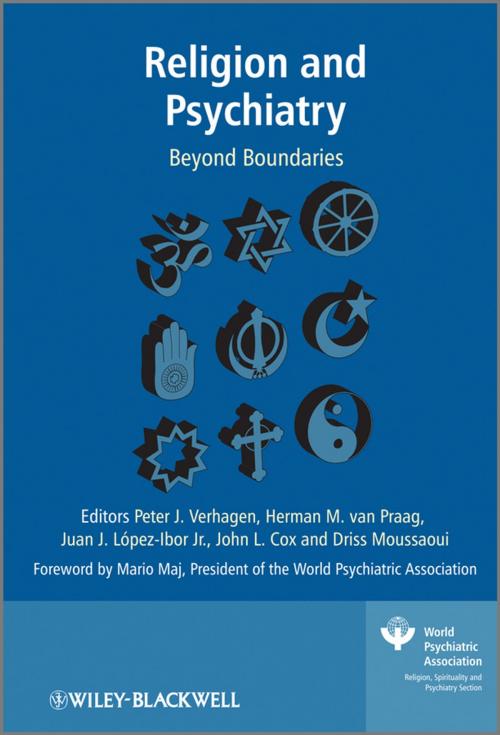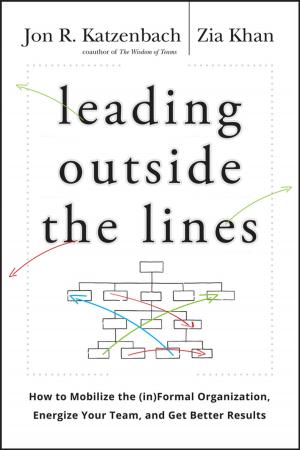Religion and Psychiatry
Beyond Boundaries
Nonfiction, Health & Well Being, Medical, Specialties, Psychiatry| Author: | Peter Verhagen, Herman M. Van Praag, John Cox, Driss Moussaoui, Juan José López-Ibor | ISBN: | 9781118378427 |
| Publisher: | Wiley | Publication: | February 27, 2012 |
| Imprint: | Wiley | Language: | English |
| Author: | Peter Verhagen, Herman M. Van Praag, John Cox, Driss Moussaoui, Juan José López-Ibor |
| ISBN: | 9781118378427 |
| Publisher: | Wiley |
| Publication: | February 27, 2012 |
| Imprint: | Wiley |
| Language: | English |
Religion (and spirituality) is very much alive and shapes the cultural values and aspirations of psychiatrist and patient alike, as does the choice of not identifying with a particular faith. Patients bring their beliefs and convictions into the doctor-patient relationship. The challenge for mental health professionals, whatever their own world view, is to develop and refine their vocabularies such that they truly understand what is communicated to them by their patients. Religion and Psychiatry provides psychiatrists with a framework for this understanding and highlights the importance of religion and spirituality in mental well-being.
This book aims to inform and explain, as well as to be thought provoking and even controversial. Patiently and thoroughly, the authors consider why and how, when and where religion (and spirituality) are at stake in the life of psychiatric patients. The interface between psychiatry and religion is explored at different levels, varying from daily clinical practice to conceptual fieldwork. The book covers phenomenology, epidemiology, research data, explanatory models and theories. It also reviews the development of DSM V and its awareness of the importance of religion and spirituality in mental health.
What can religious traditions learn from each other to assist the patient? Religion and Psychiatry discusses this, as well as the neurological basis of religious experiences. It describes training programmes that successfully incorporate aspects of religion and demonstrates how different religious and spiritual traditions can be brought together to improve psychiatric training and daily practice.
- Describes the relationship of the main world religions with psychiatry
- Considers training, policy and service delivery
- Provides powerful support for more effective partnerships between psychiatry and religion in day to day clinical care
This is the first time that so many psychiatrists, psychologists and theologians from all parts of the world and from so many different religious and spiritual backgrounds have worked together to produce a book like this one. In that sense, it truly is a World Psychiatric Association publication.
Religion and Psychiatry is recommended reading for residents in psychiatry, postgraduates in theology, psychology and psychology of religion, researchers in psychiatric epidemiology and trans-cultural psychiatry, as well as professionals in theology, psychiatry and psychology of religion
Religion (and spirituality) is very much alive and shapes the cultural values and aspirations of psychiatrist and patient alike, as does the choice of not identifying with a particular faith. Patients bring their beliefs and convictions into the doctor-patient relationship. The challenge for mental health professionals, whatever their own world view, is to develop and refine their vocabularies such that they truly understand what is communicated to them by their patients. Religion and Psychiatry provides psychiatrists with a framework for this understanding and highlights the importance of religion and spirituality in mental well-being.
This book aims to inform and explain, as well as to be thought provoking and even controversial. Patiently and thoroughly, the authors consider why and how, when and where religion (and spirituality) are at stake in the life of psychiatric patients. The interface between psychiatry and religion is explored at different levels, varying from daily clinical practice to conceptual fieldwork. The book covers phenomenology, epidemiology, research data, explanatory models and theories. It also reviews the development of DSM V and its awareness of the importance of religion and spirituality in mental health.
What can religious traditions learn from each other to assist the patient? Religion and Psychiatry discusses this, as well as the neurological basis of religious experiences. It describes training programmes that successfully incorporate aspects of religion and demonstrates how different religious and spiritual traditions can be brought together to improve psychiatric training and daily practice.
- Describes the relationship of the main world religions with psychiatry
- Considers training, policy and service delivery
- Provides powerful support for more effective partnerships between psychiatry and religion in day to day clinical care
This is the first time that so many psychiatrists, psychologists and theologians from all parts of the world and from so many different religious and spiritual backgrounds have worked together to produce a book like this one. In that sense, it truly is a World Psychiatric Association publication.
Religion and Psychiatry is recommended reading for residents in psychiatry, postgraduates in theology, psychology and psychology of religion, researchers in psychiatric epidemiology and trans-cultural psychiatry, as well as professionals in theology, psychiatry and psychology of religion















